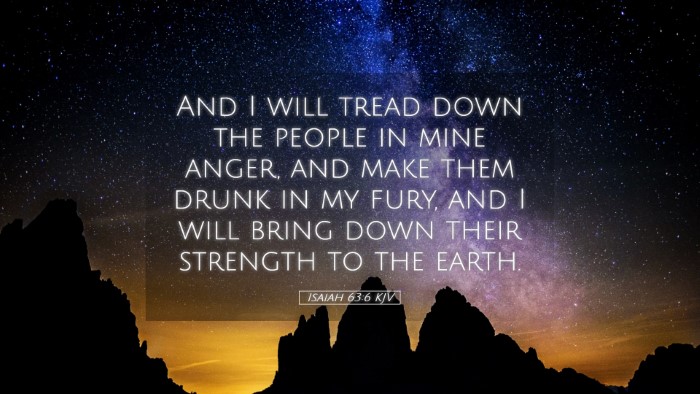Commentary on Isaiah 63:6
Verse: "And I trod down the people in mine anger, and made them drunk in my fury, and I brought down their strength to the earth."
Introduction
This verse from Isaiah stands as a profound testament to God's judgment and the fierce reality of His righteousness. The prophet Isaiah here communicates a vivid image of divine wrath executed against those who oppose God's will. It is critical for pastors, students, theologians, and Bible scholars to delve into this verse, drawing upon insights from respected public domain commentaries to illuminate its profound meanings.
Contextual Background
In the wider context of Isaiah, chapters 63 through 66 portray a picture of hope amidst judgment. The juxtaposition of God’s fierce anger with His ultimate compassion highlights both His holiness and His love for His people. The verses leading up to Isaiah 63:6 recount God's past mercies and judgments, setting the stage for the powerful imagery that follows.
Matthew Henry's Insights
Matthew Henry elaborates on the severity of divine retribution, emphasizing that there are times when God must act decisively against the oppressors of His people. He interprets this verse as a sign of God’s determination to reclaim His glory and justice, even at the cost of pride and human strength. According to Henry, the metaphor of treading down reflects not merely victory but also the crushing weight of divine judgment that falls upon those who resist God's ways.
Albert Barnes' Observations
Albert Barnes provides valuable insight into the language of the verse. He explains that the terms here indicate not just physical aggression but a spiritual consequence of God's wrath—a ‘drunkenness’ brought about by overwhelming judgment. He underscores a vital theological principle: those who oppose God are often left in a state of confusion and disarray. This ‘drunkenness’ symbolizes both the nature of divine judgment and its impact, leading to the collapse of human strength against the sovereignty of God.
Adam Clarke’s Perspective
Adam Clarke adds depth by exploring the thematic implications of strength and pride. He suggests that the imagery of drinking from the cup of fury portrays how the nations and peoples, in their rebellion against God, face inevitable defeat. Clarke asserts that God's fury serves a dual purpose—it chastens the unrepentant and affirms the beauty of His grace extended towards those who turn back to Him. Strength, in Clarke's analysis, is an illusion for those who stand against the Almighty.
Theological Implications
The analysis of Isaiah 63:6 opens fertile ground for theological reflection. It raises vital questions about the nature of God's judgment and the balance of justice and mercy. This passage, while stark, propels us toward understanding the importance of God's holiness, the devastation of sin, and the ultimate hope found in repentance and redemption.
- God’s Sovereignty: Isaiah 63:6 demonstrates God's absolute power over nations and individuals, reminding believers of the futility of resisting divine will.
- The Reality of Divine Judgment: The verse serves as a sober reminder of the reality and severity of God's wrath, especially for those who stand in opposition to Him.
- The Promise of Redemption: While judgment is a central theme, the broader narrative of Isaiah hints at God’s salvific work, offering hope in His mercy.
Pastoral Applications
As pastors share the message contained in Isaiah 63:6, it is essential to help congregants understand the nature of God's judgment without losing sight of His love and grace. The challenge lies in presenting a balanced view that acknowledges God's righteousness while calling individuals to respond to His mercy.
Exhortation to Repentance
This verse serves as a powerful call to examine one's own life. Believers are urged to authentically confront their sin before God, as He is just and will not ignore rebellion against His holiness. There exists an invitation, however, to repent and find refuge in His grace.
Encouragement During Trials
Isaiah 63:6 can foster encouragement in congregations facing oppression and trial. Understanding that God is fighting for His people against their adversaries offers hope and assurance that ultimate justice will prevail.
Conclusion
In grappling with the weighty themes presented in Isaiah 63:6, we gain insight into God's character and His dealings with humanity. By synthesizing perspectives from Matthew Henry, Albert Barnes, and Adam Clarke, we arrive at a richer, more nuanced understanding of this powerful verse. This understanding invites both awe and reverence, underscoring the importance of living in alignment with God’s will while resting in His unfailing mercy.


